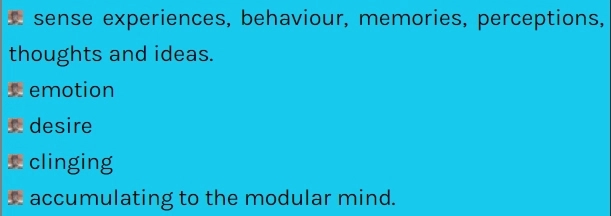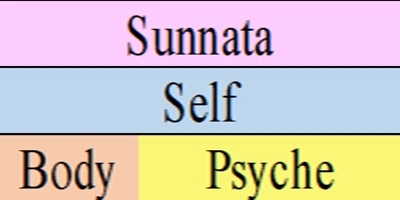Modular Mind and Natural Conditioning
Do we have a choice about conditioning?
This is an important question that is not asked because our 1%-system benefits from people not being aware that they are conditioned. This system promotes greed, valuing accumulation as prestige or status. Whilst there are some good people who reject this attachment to greed and the damage it causes to the planet and humanity, most just accept the conditioning that greed is acceptable and join in with it.
Once this greed is accepted there is much damage against Natural Law. This acceptance of personal accumulation is leading to economic catastrophe as discussed here. We already have environmental devastation through exploitation by the accumulators, and to top that off the accumulators, Koch Brothers, pay for climate denial to further promote their greed. How senseless is this. Even less sensible is the way this need for accumulation causes global war and suffering, and on a personal level leads to wage-slavery.
Whilst accepting greed is the worst aspect of the conditioning it is not the only aspect of conditioning that is damaging. In this post scepticism leads people like Rupert Sheldrake to question fundamental scientific dogma. When our scientific establishment fails to examine its own conditioning and presents us with limited knowledge of who we are as humans, how we interact together, how we act together as ONE planet then we have to question science and its education - we have to question the basis of education as a whole, but we don't.
Failure to examine our conditioning is against Natural Law. So it is necessary to understand what conditioning is and how it arises. Above I have described the worst aspects of conditioning, and whilst much of this conditioning benefits the 1% and their political system it is far from being the only conditioning that is happening. Conditioning is happening all the time from the smallest and least important to the drastic acceptance of accumulation and its global impact.
Here is a limited version of the important teaching of paticcasamuppada (law of dependent origination) or as Buddhadasa describes it Idappaccayata-paticcasamuppada in order to stress that it is Natural Law:-

This is discussed in detail by Matriellez in mindfulness meditation and mindfulness generally.
But let us consider it here. We experience something through our sense - this can include a thought or idea. We react emotionally to this thought or idea, we desire or are averse to this experience, we feel strongly about it - one way or the other, and as a result it becomes added to our modular mind. Once added to our modular mind we have been conditioned.
Let us consider this notion of modular mind. Science is not willing to reach agreement as to the nature of mind preferring to accept different views; one such view is that of modular mind. This view says that mind aggregates various "selves" as part of a modular mind, and dependent origination is a description of the way such selves could arise. These aggregated selves are created through sense experiences that are clung to as a self - this is conditioning through sense experience. Personally this is how I understand mind to work but for science/academia I present this in an observational way - a forced "deception".
This is a natural process of conditioning but because we dont examine this conditioning process through education it becomes an oppressive process as we have no control of it. Desire as greed is natural but it needs to be curbed. Some religions will tell you greed is bad but mostly as humans we are subject to propaganda that enforces the acceptability of such greed by glamourising the lives of the rich and famous. Because of this repetitive clinging greed becomes more and more entrenched as part of our selves - our modular mind. We accept that we are greedy.
In examining this process of conditioning in which selves are added to the modular mind we can see a way through the problem. There is the experience that becomes part of the modular mind. If we are clinging to the experience that is hard to fight, once the desire arises it is also hard to fight, even just liking or disliking is difficult to work through, so if we want to control our conditioning then we need to intercept any formation of emotion, desire or clinging. Matriellez was discussing this in regards to mindfulness meditation, and suggested using watchfulness in meditation to intercept the forming of selves through emotion, desire and clinging.
There is a conditioning moment - phassa (discussed here) in which we can intercept the self from forming. We can stop the conditioning. Education could choose to stop the conditioning (Matriellez discusses it on this page). Science could choose to be sceptical of its 10 dogmas. Our system could choose to be wary of what are real and imaginary economic transactions and control them. There is a choice, there is a conditioning moment that we can choose to control or not; BUT we don't.
Once we become aware that we are conditioned then we can begin to intercept the formation of new conditioned selves. But by that time of life the problem is that our minds are conditioned through upbringing and education. So the problem is similar but different, how do we remove the conditioning? The process is similar in the sense that we use meditation to examine the modular mind for selves that have aggregated there, and once we recognise these aggregations we can examine see them for the conditioning they are and remove the clinging, desire and emotion that put them there in the first place.
At this point we have recognised conditioning, we can choose to prevent that conditioning from arising, and also work on the conditioning that has arisen. So that leaves the question, what happens to us if there is no conditioning? Do we stop functioning if all there is is conditioned selves?
Buddhadasa described us as having 4 systems; according to Santikharo, who is generally recognised as Buddhadasa's conduit to the West, this was what he was working on towards his death. These systems are described as body, psyche, self and emptiness, and I have summarised these 4 systems in this meme:-

Through our conditioning we aggregate selves to the self-system. In a sense this self system blocks access to "emptiness", I choose the Pali word Sunnata for this emptiness; Buddhadasa described it as Void mind, void of self. So through our deconditioning we remove selves leaving access to sunnata, and this sunnata is what enables us to function.
Well almost completely. If there is only sunnata we are not alive. For the optimum state of life we need human functioning but without conditioning - no selves, so that within that optimum state we are functioning through sunnata. But our humanity is maintained through the 5 khandhas, body - rupa, vedana - feeling, sanna - memories and perceptions, sankhara - mental operations and vinnana - consciousness; Buddhadasa divided these as body and psyche. How does this work? These khandhas are the basic arena of sense experience (as described in dependent origination). And humans need sense experience. But what happens to that sense experience, is it just left as is? No, we allow it to become selves through the process of emotions, desire and clinging, so that these sense experiences become my sense experience (having accumulated in the modular mind). But if we do not allow these sense experiences to form as selves (attach) in the modular mind, then we can experience life as it is meant to be experienced - through sunnata.
This is the Natural Law. Within this law there is the conditioning of selves as a natural process, there is the point at which we choose whether to allow conditioning, and there are the ways we can remove the conditioning (meditation or otherwise) that allow us to live naturally - through sunnata.
|



